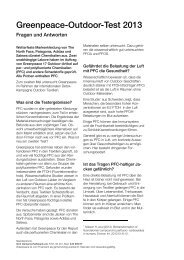SOLAR GENERATION - Greenpeace
SOLAR GENERATION - Greenpeace
SOLAR GENERATION - Greenpeace
You also want an ePaper? Increase the reach of your titles
YUMPU automatically turns print PDFs into web optimized ePapers that Google loves.
achieve a sustainable market in solar electricity in the<br />
industrialised world, that such access guarantees are a foremost<br />
consideration.<br />
NEW MARKET OPPORTUNITIES<br />
Clearly, just as with other emerging technology markets,<br />
decisions are not without their associated financial risks. The<br />
clear upward trend of current market developments, however,<br />
points to major opportunities for both existing and new players<br />
in the solar electricity sector. The expanding list of companies<br />
and consortia currently formulating strategies for exploiting<br />
the solar market is evidence of this.<br />
For the market really to take off, however, the pioneers of<br />
yesterday who have evolved into the market leaders of today<br />
must be joined by a widening industrial base so that the whole<br />
sector can secure the business successes of tomorrow, the<br />
potential for which has been mapped out in this report.<br />
Entry into the solar electricity market is not the preserve of<br />
companies only active in the clean energy sector. Many of the<br />
leaders in the solar electricity industry were, and still are,<br />
leading lights in the “old” energy economy. These global players<br />
have taken on board the challenge to integrate a solar electricity<br />
business into a traditional energy production and retail<br />
structure. The sustained commitment of these companies will<br />
be appropriately rewarded if we create the right climate to<br />
ensure that the whole solar electricity business sector moves<br />
rapidly ahead.<br />
Against this, there are also potential losers in the energy<br />
industry. Amongst these are those companies that have<br />
continued to focus solely on conventional energy technologies.<br />
With no base or limited expertise available to them in the solar<br />
sector, it will become increasingly difficult for these companies<br />
to benefit from the expanding photovoltaics market. Its<br />
expected growth over the next few decades will rapidly<br />
enhance the role that this technology will play in the energy<br />
mix. For any organisation missing the boat, the consequences<br />
could be similar to those for data processing companies which<br />
failed to predict the impact that personal computers would<br />
have on every aspect of business and domestic life in the 1980s.<br />
Even once mighty blue chip companies such as IBM are still<br />
trying to recover from a lack of vision at a critical moment.<br />
GOVERNMENT AND INDUSTRY COMMITMENT<br />
Governments that have taken steps to broaden their energy<br />
supply base with an abundant clean technology such as<br />
photovoltaics will also be able to count themselves among the<br />
winners. Such diversification not only brings benefits in terms<br />
of greater security of energy supply but also leads to wider<br />
environmental benefits though the deployment of zeroemission<br />
technologies which, according to the predictions<br />
presented here, will make a significant impact on global COc<br />
emissions over the coming decades.<br />
At present, the nations of the industrialised world vary greatly<br />
in their commitment to solar electricity. While countries such<br />
as Germany and Japan, as well as others in Europe, have moved<br />
forward from discussion to implementing the necessary<br />
support schemes, others have actually cut back their solar<br />
electricity programmes. In the United States in particular, this<br />
could severely affect the ability of the national solar electricity<br />
industry to fulfil its promise as a global exporter providing for<br />
sustainable employment at home.<br />
Both industry and governments, however, will have to extend<br />
their differing commitments to the solar sector if the potential<br />
identified in this report is to be fully exploited. On the industry<br />
side, continuing and accelerated investment in the expansion<br />
of production facilities is needed in order to meet the demands<br />
of the market and to ensure that the cost, and ultimately the<br />
price of the technology, is brought down through production<br />
up-scaling and introduction of new manufacturing techniques<br />
and materials. On the government side, the commitment to the<br />
solar electricity sector in many countries needs to be extended.<br />
Besides the introduction of net metering and premium tariffs,<br />
building regulations need to be adapted to provide a greater<br />
incentive for the deployment of solar electricity systems in the<br />
built environment.<br />
Like every other industry, the solar electricity sector will only<br />
move forward if sufficient investment is committed to provide<br />
for its expansion. New sources of equity and debt financing<br />
need to be tapped. Such investment opportunities must attract<br />
new entrants to the sector from financial institutions which<br />
have been made aware of the potential of the solar electricity<br />
business. It is significant, for example, that investment in solar<br />
production and supply companies is being taken increasingly<br />
seriously by international investment analysts, while the<br />
influential Economist magazine has portrayed solar cells as<br />
part of a new “micropower” revolution.<br />
In summary, there is no doubt that the global electricity<br />
business will undergo a significant expansion over the next<br />
few decades. All indicators point in that direction. Solar power<br />
will certainly play an ever more significant role in the supply<br />
mix. However, the extent to which solar electricity will make its<br />
impact on that market will depend very much on ensuring that<br />
the potential winners in this business are made fully aware of<br />
the opportunities available.<br />
Those opportunities will only be realised if both industry and<br />
governments continue to strengthen their commitment to<br />
broadening the energy supply base and, through the<br />
deployment of solar electricity technologies, offering greater<br />
choice to customers. This will have the added effect of<br />
demystifying the energy process, offering individuals greater<br />
control over the provision of their electricity needs. This in itself<br />
constitutes a revolution in the energy market.<br />
47

















